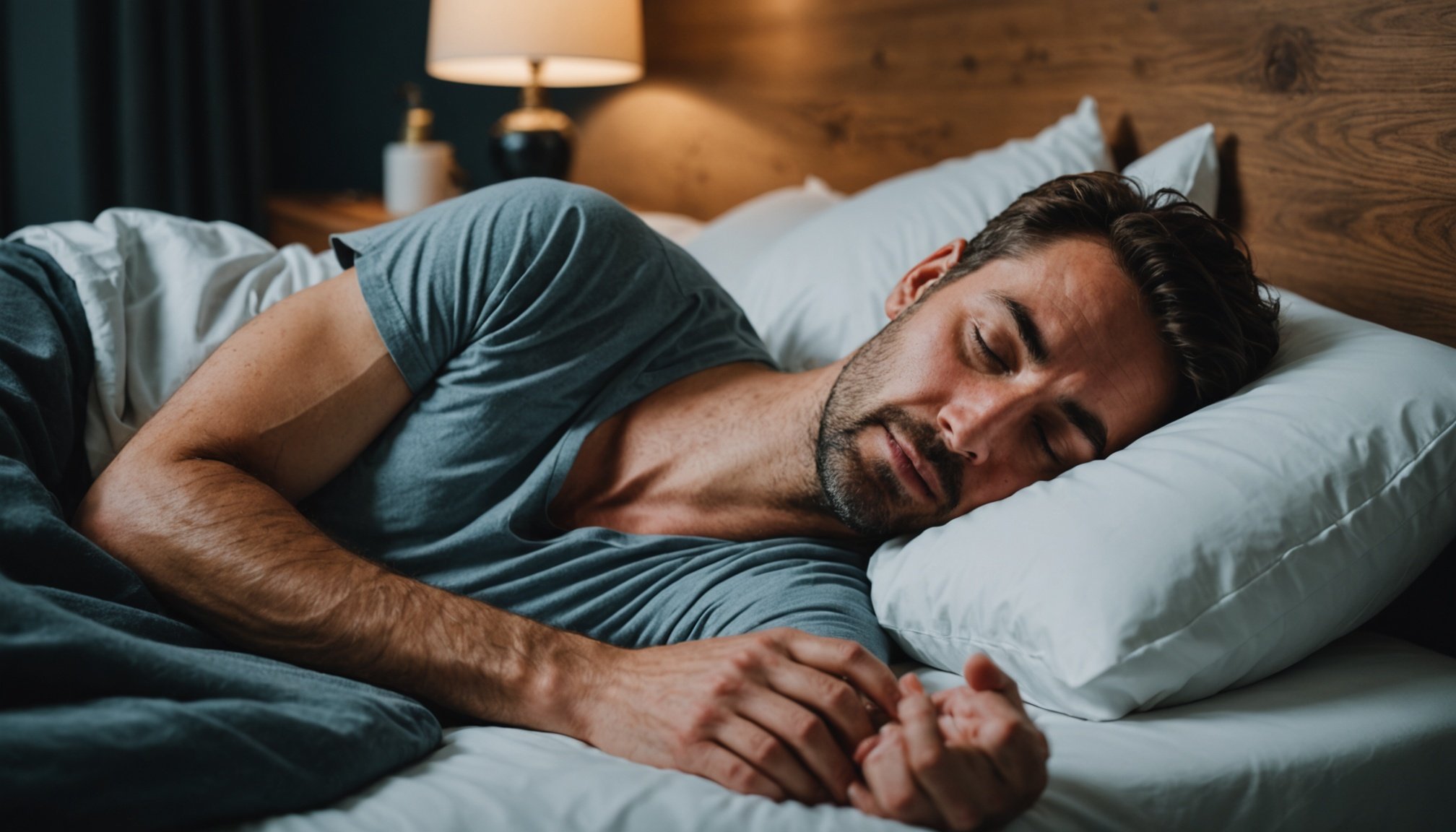Master the Art of Sleep Hygiene: Your Ultimate Guide to Overcoming Insomnia
Understanding Insomnia and Its Impact on Health
Insomnia, a pervasive sleep disorder, affects millions of people worldwide, disrupting their sleep patterns and significantly impacting their overall health. It is characterized by difficulty falling asleep, staying asleep, or both, despite adequate opportunities to sleep. This condition can lead to a range of health issues, including immune system suppression, impaired cognitive and motor function, and an increased risk for heart disease, heart attacks, stroke, and diabetes.
Insomnia is not just a minor annoyance; it can be a precursor to more serious health problems. For instance, chronic insomnia can exacerbate anxiety and depression, making it a critical issue to address. As noted by health experts, “Poor sleep is often a precursor to relapse, as not feeling rested during recovery can cause people to turn back to alcohol abuse as a coping method”.
Additional reading : Crafting Your Unique Gut Health Enhancement Strategy: A Step-by-Step Guide
The Importance of Sleep Hygiene
Sleep hygiene refers to the practices and habits that help promote better quality sleep. It is essential to develop good sleep hygiene to reset your body’s natural clock, or circadian rhythm. Here are some key aspects of sleep hygiene:
Follow a Sleep Schedule
Maintaining a consistent sleep schedule is crucial. This means going to bed and waking up at the same time every day, including weekends. Consistency helps regulate your body’s internal clock, making it easier to fall asleep and stay asleep.
In parallel : Finding calm: naturopathic treatments for anxiety relief
Create a Conducive Sleep Environment
The environment in which you sleep plays a significant role in your sleep quality. Ensure your bedroom is dark, quiet, and cool. Invest in a comfortable mattress and pillows, and consider using earplugs, a white noise machine, or blackout curtains if necessary. Avoid having a TV, computer, or other electronic devices in the bedroom, as they can disrupt sleep.
Avoid Naps
While naps can be refreshing, they can interfere with your ability to sleep well at night. If you must nap, keep it short (under 30 minutes) and avoid napping close to bedtime. Long or late naps can disrupt your sleep schedule and make it harder to fall asleep at night.
Engage in Relaxation Techniques
Activities like yoga, meditation, and deep breathing can help calm your body and mind before bed. These practices reduce stress and anxiety, making it easier to fall asleep. For example, “yoga and meditation help to calm your body and mind, which in turn will make it easier for you to fall asleep”.
Behavioral Conditioning for Better Sleep
Behavioral conditioning is a powerful tool in overcoming insomnia. Here are some strategies that can help:
Sleep Compression Therapy
This therapy involves reducing the amount of time spent in bed to the amount of time actually spent sleeping. For instance, if you spend 10 hours in bed but only sleep for 6 hours, you would limit your time in bed to 6 hours. This helps your body associate the bed with sleep rather than other activities like watching TV or reading.
Stimulus Control
Stimulus control involves removing any stimuli from the bedroom that might interfere with sleep. This means avoiding activities like eating, watching TV, or using electronic devices in bed. The goal is to associate the bed solely with sleep and intimacy.
Cognitive Behavioral Therapy for Insomnia (CBT-I)
CBT-I is a non-pharmacological approach that addresses the underlying thoughts and behaviors contributing to insomnia. It helps individuals identify and change negative sleep habits and thought patterns that interfere with sleep. For example, “cognitive behavioral therapy can help you work through your thoughts and emotions so they no longer keep you up at night”.
Managing Total Time in Bed (TTIB)
One of the most significant behavioral factors affecting sleep is the total time spent in bed (TTIB). Here’s how to manage it effectively:
Consistent Bedtime and Waking Time
Maintaining a consistent bedtime and waking time is essential. This helps regulate your body’s internal clock and improves the quality of your sleep. Avoid staying in bed for extended periods, as this can reinforce the tendency to wake up during the night.
Avoid Overextending Bedtime
Spending too much time in bed can lead to fragmented sleep. If you go to bed early and wake up late, you may be stretching out your TTIB, which can make it difficult to sleep through the night. Aim for a consistent sleep schedule and avoid napping during the day to maintain a healthy TTIB.
Additional Strategies for Improving Sleep Quality
Medications and Professional Help
For some, insomnia may require professional help. Non-addictive sleep medications prescribed by a psychiatrist can help establish a normal sleeping habit. Additionally, therapies like CBT-I and sleep restriction therapy can be highly effective when guided by a healthcare professional.
Lifestyle Changes
Lifestyle changes can also significantly impact sleep quality. Regular physical activity, a balanced diet, and avoiding caffeine and alcohol close to bedtime can all contribute to better sleep. Here’s a detailed list of lifestyle changes you can make:
- Regular Exercise: Engage in physical activity during the day, but avoid vigorous exercise close to bedtime.
- Balanced Diet: Eat a healthy, balanced diet and avoid heavy meals close to bedtime.
- Avoid Stimulants: Avoid caffeine, nicotine, and alcohol, especially in the hours leading up to bedtime.
- Limit Screen Time: Avoid screens (phones, tablets, TVs) at least an hour before bedtime due to the blue light they emit.
Table: Comparing Different Sleep Improvement Strategies
| Strategy | Description | Benefits | Potential Drawbacks |
|---|---|---|---|
| Sleep Schedule | Maintain a consistent bedtime and waking time. | Regulates circadian rhythm, improves sleep quality. | Can be challenging to stick to, especially on weekends. |
| Sleep Environment | Ensure the bedroom is dark, quiet, and cool. | Enhances sleep quality, reduces sleep disruptions. | May require investment in new bedding or blackout curtains. |
| Avoid Naps | Limit naps to under 30 minutes and avoid napping close to bedtime. | Helps maintain a consistent sleep schedule. | Can be difficult for those who are sleep-deprived. |
| Relaxation Techniques | Engage in yoga, meditation, or deep breathing before bed. | Reduces stress and anxiety, promotes relaxation. | May require practice to become effective. |
| Sleep Compression Therapy | Limit time in bed to the amount of time actually spent sleeping. | Helps associate the bed with sleep, improves sleep efficiency. | Can be challenging to adjust to a new sleep schedule. |
| Cognitive Behavioral Therapy (CBT-I) | Addresses underlying thoughts and behaviors contributing to insomnia. | Highly effective in changing negative sleep habits. | Requires professional guidance, can be time-consuming. |
| Medications | Use non-addictive sleep medications as prescribed by a psychiatrist. | Helps establish a normal sleeping habit. | May have side effects, should be used under medical supervision. |
Real-Life Examples and Anecdotes
Understanding the practical application of these strategies can be incredibly helpful. Here’s an example:
Imagine someone who has been struggling with insomnia for months. They go to bed at 10 PM but often wake up multiple times during the night and stay in bed until 9 AM the next morning. This person is stretching out their TTIB, which is exacerbating their insomnia. By implementing sleep compression therapy and maintaining a consistent bedtime and waking time, they can start to see improvements in their sleep quality.
Overcoming insomnia is a journey that requires patience, consistency, and the right strategies. By focusing on sleep hygiene, behavioral conditioning, and making necessary lifestyle changes, you can significantly improve your sleep quality.
As one expert notes, “The cure was ultimately simple, and consisted of a simple 2-point plan: sleep environment upgrading and behavioural conditioning”. This simplicity is key; it’s about making small, consistent changes that add up over time.
Remember, good sleep is not just a luxury; it’s a necessity for your overall health and well-being. By mastering the art of sleep hygiene, you can wake up feeling refreshed, energized, and ready to take on the day.
Final Tips and Resources
- Stay Informed: Keep up-to-date with the latest research and guidelines from reputable sources like the National Institutes of Health (NIH) and the National Library of Medicine (NLM).
- Seek Professional Help: If your insomnia persists, consider seeking help from a healthcare professional or a therapist specializing in sleep disorders.
- Online Resources: Utilize online resources such as the American Academy of Sleep Medicine (AASM) and the National Sleep Foundation (NSF) for additional tips and support.
By following these guidelines and staying committed to improving your sleep hygiene, you can overcome insomnia and enjoy a good night’s sleep every night.











